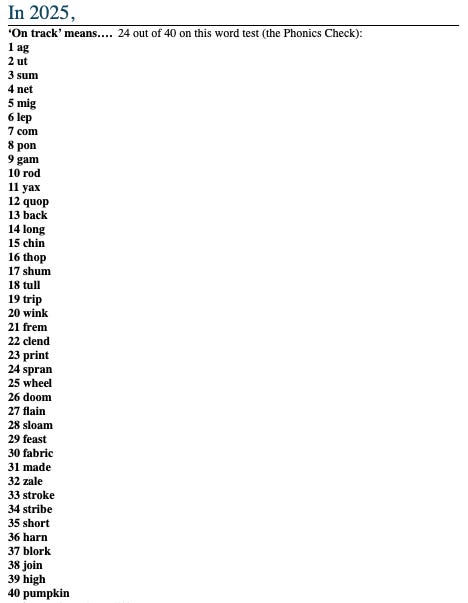Phonics Data and Te Tiriti: Stanford’s Abdication of Responsibility
In response to questions put to her by Debbie Ngarewa Packer in the House on Thursday 6 November about the removal of Te Tiriti o Waitangi from Section 127 of the Education and Training Act, Erica Stanford made the following assertions:
A process undertaken by Minister Goldsmith with regard to the Treaty Principles Bill came back with a conclusion that it was questionable for school boards to be delegated a core Crown duty — ie, to uphold their obligations under Te Tiriti.
She took very seriously her requirement to uphold her core Crown duty to abide by the principles of the Treaty, and said “the core tenant of that is to raise Māori achievement”.
Her Government has raised Māori achievement like no other, as proved by the early phonics data.
I will deal with these assertions one by one.
The Delegation of Duty
School boards are Crown entities, and so carry the authority of the Crown. The Waitangi Tribunal has found that there can be no delegation of authority without responsibility. Stanford is claiming here that she is giving boards the authority to enact government policy, but relieving them of their responsibility to uphold their obligations under Te Tiriti. This is a position at odds with The Waitangi Tribunal.
In effect, Stanford is telling boards, Don’t worry about the Treaty — we’ve got it covered. Just do what we order and you will too.
The Crown’s Duties in Education
Let’s assume her position is valid: the Government can assume total responsibility for board Treaty obligations. What does that mean we could expect to see happening?
At the very least, there would be active, intentional Māori involvement in the development of the education system’s policies and settings, including curriculum, aims and objectives. This has not happened. In the same exchange, Ngarewa Packer asked Stanford which Māori had been consulted, listened to or who supported her decision to remove Te Tiriti. Stanford did not answer that question, aside from pointing to the Māori members of Cabinet.
So what we appear to have is one party to Te Tiriti, the Crown, making a unilateral decision regarding what upholding its obligations looks like in education.
Phonics as Evidence
But let’s assume Stanford has it right, and all Māori want from the education system is academic achievement for their tamariki. Stanford claimed success in turning the tide of Māori underachievement by pointing to the early phonics data recently released. However, this data has been convincingly critiqued as substandard. Among other things, it was overrepresented with European students, relied on self reporting, provided no clarity around the sampling frame and did not go through peer review. In other words, the data is nowhere near robust enough to claim causation, let alone system-level success. And yet, Stanford is.
We must also question whether this phonics data, which Stanford is rhetorically tying tightly to her implementation of a knowledge-rich curriculum grounded in the science of learning, is an indicator of the kind of academic achievement parents want. Her move away from whole- and balanced-literacy instruction to structured literacy instruction with its heavy reliance on phonics gives us an easy way to make a comparison.
For example, in 2010, a time when National Standards were being brought in, “On track” meant after one year at school, students
will read, respond to, and think critically about fiction and non-fiction texts at the green level of Ready to Read, and
they will use their writing to think about, record, and communicate experiences, ideas, and information to meet specific learning purposes across the curriculum.
These are complex literacy skills. In comparison, Stanford’s data comes from a phonics check that requires students to get 24 out of 40 ‘reading’ something like the following:
58% percent of students in the data she refers to passed that check. Schools that reached that percentage in previous years were seen as not performing.
School boards, Stanford wants you to believe that she has you covered, and you ensuring this happens in your school is you upholding your obligations to Te Tiriti.
(Oh, don’t forget to sprinkle a few Māori words around now and then. But not in maths, please).
Delegation Without Responsibility is Abdication
If my kids were still in Year 1, I would be dismayed at the lack of belief and ambition Stanford’s education system had of them. I also think it is a stark symbol for how Stanford’s claims to take her Treaty obligations seriously ring hollow.
For here we have a Treaty partner who wants to assume all the responsibility, who has deemed unilaterally what counts as meeting those Treaty responsibilities, and who is constructing an education system that heralds transformation when 58% of Year 1 kids can bark at a list of 40 sounds.
Here we have a Treaty partner who, when asked in the House, will not say who she has listened to when assuming that responsibility.
Stanford often proudly claims to have turned the tide in education, and she is right. It’s a king tide, racing in and hammering the shore, reducing our kids’ opportunities to roam and discover and think and connect.
Read More
When Phonics Isn’t Reading: Why Today’s ‘Literacy Breakthrough’ Doesn’t Add Up
How the national phonics test is failing England and why it will fail Australia too




For me, in terms of Te Tiriti, it's rather simple. Every single person in Aotearoa has a duty and moral obligation to uphold and give positive action to the promises made in te Tiriti o Waitangi for our own edification and integrity and for future generations --- full --- stop.
"Ehara rawa te taki ā-kākā i te pānui"
https://teirimana.substack.com/p/ehara-rawa-te-taki-a-kaka-i-te-panui